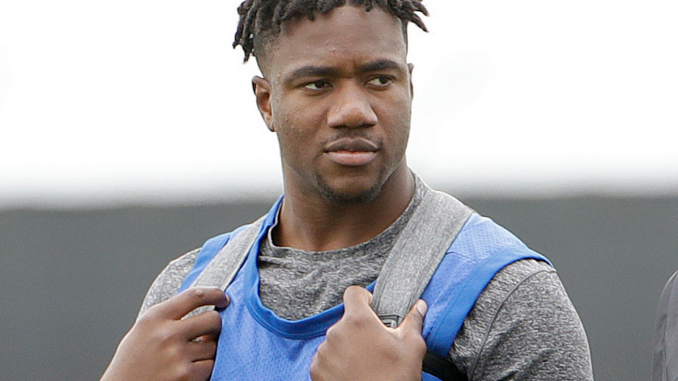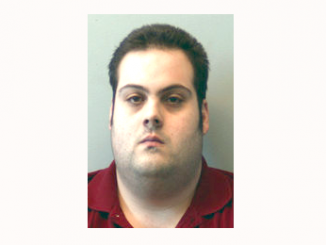
This story was printed in the Post on June 6.
BY ALLISON LEVITSKY
Daily Post Staff Writer
Weeks after Brock Turner sexually assaulted an unconscious woman outside a party at the Kappa Alpha fraternity, another Stanford athlete was accused of raping a sophomore whom he met while partying at the same frat — and went on to be drafted by the Indianapolis Colts.
The difference? Whereas Turner was sentenced to jail after a highly publicized criminal case that led to Judge Aaron Persky’s recall, Colts linebacker Bobby Okereke never faced a criminal investigation, or any discipline from Stanford. Both hired the same lawyer, Michael Armstrong.
The Fountain Hopper, an underground Stanford student newspaper distributed via email, identified Okereke on Tuesday as the previously unnamed subject of a December 2016 New York Times story panning Stanford’s internal sexual misconduct adjudication process as “marred by procedural errors.”
Santa Clara County Superior Court documents reviewed by the Post show that although three members of each of two five-member Stanford review panels — drawn from a pool of students, faculty members and administrators — found Okereke was responsible for sexual misconduct, he wasn’t disciplined because the university required four out of five members of the panel to agree.
Since then, Stanford has replaced the five-member panel with a three-member panel that must agree unanimously on a finding of responsibility.
After Stanford denied the woman’s second appeal and lifted a no-contact order between her and Okereke, she sought a civil restraining order against him, but Santa Clara County Superior Court Judge Carol Overton denied her request in January 2016.
Dispute over whether sex was consensual
Court documents that the woman filed in relation to that request state that she met Okereke at Kappa Alpha on Feb. 6, 2015. She took him to her dorm room, where they engaged in consensual sexual activity before she says that she told him, “I am not having sex with you.”
The woman said that Okereke asked, “Why?” and proceeded to have sex with her without her consent. Okereke’s lawyer wrote in court documents that he complied when the woman told him to use a condom and that he spent the night in the woman’s twin bed with her after the encounter.
Two days later, a campus doctor diagnosed her with acute stress disorder as a result of sexual assault, and on Feb. 13, 2015, the woman reported the assault to Stanford.
Okereke protests the allegations
Okereke wrote in a court filing nine months later that he was “shocked” to find out that the woman had initiated a rape investigation under Title IX, the federal law protecting gender equality at federally funded schools.
“I have been labeled a rapist even though I have done nothing wrong,” Okereke wrote. “These false allegations have caused me much emotional distress — I have done poorly in some classes and dropped others, and I do not feel as safe on campus as I should.”
The woman sought a civil restraining order in Santa Clara County Superior Court in November 2015 to keep Okereke away from her on campus.
“I am without protection. I was sexually assaulted on Stanford’s campus by a Stanford student and Stanford refused to protect me,” the woman wrote in her request for a restraining order on Nov. 5, 2015. “I have nowhere else to turn. I withdrew from Stanford for one quarter to try and get my life back, and because I could not face the fear of seeing (Okereke) around campus.”
The woman said that Okereke had refused to leave two fraternity parties that she attended in March 2015, allegedly in violation of Stanford’s temporary no-contact order.
In October 2015, Okereke attended a party co-hosted by the woman’s sorority, though that was after Stanford lifted the no-contact order.
He responded in court that he didn’t notice her at the parties in March 2015 and thought that the university’s no contact order didn’t require him to leave a party if he had arrived before her.
Okereke claimed that he had “assiduously avoided places where I knew she would be” and said he had never “harassed, annoyed, stalked, threatened, intimidated her or disturbed her peace.”
At the parties in March 2015, Okereke said, “her friends and supporters caused such a commotion that I had to leave. Thereafter I emailed the Title IX investigator to clarify the scope of the no contact order for my own safety, considering that (her) friends had threatened to harm me.”
Alleged victim worried she’s see Okereke
The woman said that she constantly felt on edge and anxious that Okereke would appear at social gatherings, stating that Stanford seemed “incapable or reluctant to put a no contact order in place.”
“I do not know whether it is because the respondent is a college athlete — on Stanford’s football team. I do not know whether it is just the incompetence of the Title IX office: they have lost two administrators in the last couple of months,” the woman wrote. “All I know is that I need protection from the respondent: without a civil restraining order, he will continue to harass me. I have no other remedy.”
Colts general manager Chris Ballard told reporters yesterday that he knew about the accusation against Okereke, but that the team had decided to draft him anyway.
“When we looked at it and talked to him, it was an incident from four years ago. He was never charged with a crime, he was never disciplined by the university,” Ballard said yesterday, noting that Okereke was considered for a college football award for personal character named after Pro Football Hall of Fame defensive back Ronnie Lott. “He was a team captain, up for the Lott IMPACT award, he graduated with a degree in management and engineering and he’s working on a master’s. From everything we gathered, we felt it was appropriate to take him.”
Okereke was drafted in the third round of this year’s NFL Draft.
Ballard said he learned of the allegation when Okereke addressed it during their first meeting at the Senior Bowl in January. The Colts contacted Stanford officials and others close to Okereke, but didn’t speak to the woman who accused him or her attorney.
“I don’t want to sit here and act like we don’t have sympathy for both sides,” Ballard said, noting that he has three daughters. “He was very honest about his side of the story and what occurred and how he had to move forward.”




He ought to fit in fine with the likes of Ray Rice, Tyreek Hill, Ray McDonald, Rubin Foster, Ahmad Brooks, C.J. Spillman, Kareem Hunt, etc. A rape is almost a rite of passage into the NFL.
You kinda left out Ben Roethlisberger. Hmm. Weird.
The comparison is ridiculous! One student was convicted of a crime and appropriately punished. The other was exhonerated (twice) for the ALLEGED misconduct. Therefore, no sanctions were assigned. Why are we still talking about this?!?!
He used a condom in the alleged rape? Did I read that right? Since when did rapists start using condoms?
She invited him to her dorm room after drinking with him for an hour. Sounds like a date. Did she hope for a relationship out of this evening? Is he being unfairly prosecuted?